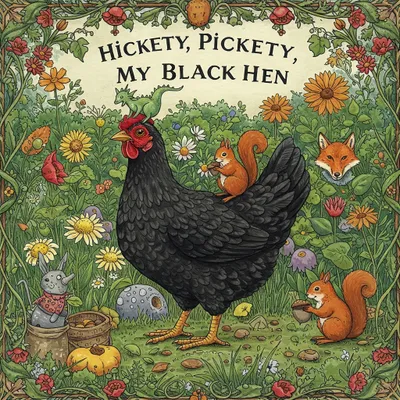Hickety, Pickety, My Black Hen

Lyrics
She lays eggs for gentlemen;
Gentlemen come every day
To see what my black hen doth lay.
Hickety, pickety, my black hen,
She lays eggs for gentlemen;
Sometimes nine, Sometimes ten,
Hickety, pickety, my black hen
History and Meaning
"Hickety, Pickety, My Black Hen" emerged sometime in the 18th or early 19th century as a simple verse about a reliable hen that lays eggs for gentlemen who visit daily to collect them. Unlike many nursery rhymes believed to contain hidden political meanings, this rhyme is generally considered purely recreational, created primarily for its pleasing sounds and rhythmic appeal.
The catchy opening phrase "Hickety, pickety" demonstrates how nursery rhymes often use nonsense words for their phonetic qualities, making them easy and enjoyable for children to repeat. The rhyme's straightforward narrative provides a glimpse into daily rural life, when egg-laying hens were a common and important part of household economies.
While primarily entertaining, the rhyme subtly introduces concepts of responsibility, daily work, and economic exchange. From an educational standpoint, it enhances phonetic awareness, introduces counting ("sometimes nine and sometimes ten"), and teaches basic vocabulary about animals and food production.